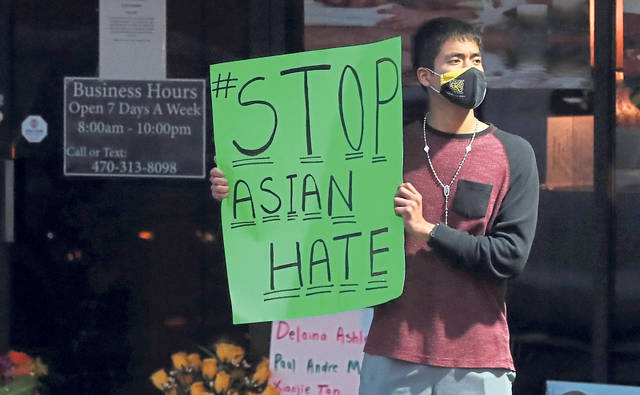Much as we might like the message of a million romantic movies and very special television episodes, love does not always conquer all.
It should. But it doesn’t. Sometimes hate wins.
We know this. Deadly attacks have dotted the country for years. While the violence and the loss of life garners the most attention, the picture it paints is also a map of hatred.
In 2018, Southwestern Pennsylvania had a front-row seat for a stunning example when the Tree of Life in Squirrel Hill became the scene of the deadliest synagogue shooting in the U.S. A Sikh temple in Wisconsin was the site of a mass shooting in 2012. Charleston was marked by an assault on Black congregants at Emanuel African Methodist Episcopal Church in 2015. In 2019, 23 people — most Latino — were killed in a Walmart in El Paso, Texas.
And on Tuesday, eight people, including six women of Asian descent, died in attacks on three Atlanta-area spas and massage parlors. A 21-year-old man has been arrested; police say he claims his sex-addiction problems as a motive, though the shootings at Asian-owned venues take place at a time of heightened attacks and harassment of Asian Americans.
This is not an exhaustive list of violent attacks based on color or religion, ethnicity or gender. It is merely a flash card of some of the most prominent. The FBI has reported increasing numbers of hate crimes since 2017.
But why? That’s a question that needs to be answered. And how does it stop?
The University of Pittsburgh and Carnegie Mellon University are showing that coming together is the way to fight all this division. The two large research schools are partnering to study extremist hate with the creation of the Collaboratory Against Hate Research and Action Center.
It is important for more than just the reasons that make us feel good.
“The (U.S.) Department of Homeland Security, the Department of Justice — those and other agencies — are very interested in supporting research in this area, and the Department of Defense is interested in identifying extremism in the military,” said Kathleen Blee, a sociologist and dean of Pitt’s Dietrich School of Arts & Sciences.
The goal is to harness all of the world-renowned expertise in medicine, law, computer science and more to ask hard questions, find needed answers and discover ways to fight the dark cancer that is spreading online and in person like another kind of pandemic.
Maybe love doesn’t conquer all. Maybe that is a naive fairy tale fantasy.
But hate can’t be contained unless it is treated like the sickness it is.








